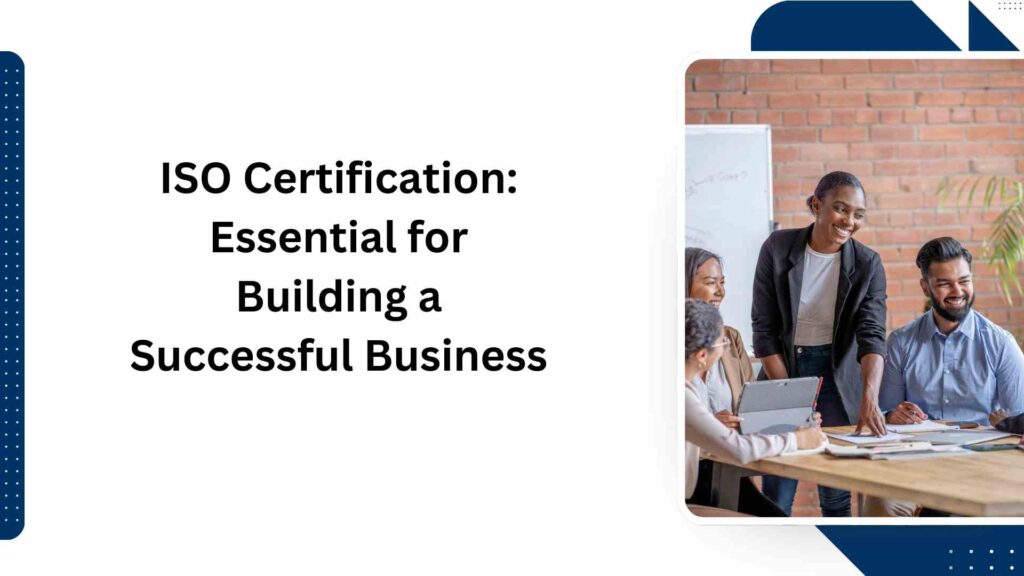In today’s highly competitive market, businesses are constantly seeking ways to enhance their performance, increase customer satisfaction, and ensure operational excellence. One of the most effective ways to achieve these goals is through ISO Certification. This certification is not just a badge of honor; it serves as a powerful tool for organizational growth and improvement. This article explores why ISO Certification is essential for building a successful business.
Understanding ISO Certification
ISO certification is a formal recognition that a business operates under international standards set by the ISO. These standards cover a wide range of aspects, including quality management, environmental management, information security, and health and safety, among others. Some of the most recognized ISO standards include:
- ISO 9001: Focuses on quality management systems.
- ISO 14001: Concentrates on environmental management systems.
- ISO 45001: Deals with occupational health and safety management.
- ISO 27001: Pertains to information security management.
Achieving ISO certification involves a rigorous process that includes defining and implementing policies and procedures, conducting internal audits, and undergoing an external audit by an accredited body.
The Importance of ISO Certification
1. Enhances Credibility and Reputation
ISO certification significantly enhances a company’s credibility. It demonstrates to customers, suppliers, and stakeholders that the organization adheres to high standards of quality and efficiency. This reputation can lead to increased trust, which is crucial for attracting and retaining customers.
2. Improves Operational Efficiency
One of the primary focuses of ISO standards is to streamline processes and eliminate inefficiencies. By adhering to these standards, businesses can identify areas of improvement, reduce waste, and optimize operations. This leads to lower costs and improved profitability.
3. Increases Customer Satisfaction
ISO certification emphasizes a customer-centric approach. By implementing quality management systems (like ISO 9001), businesses can better understand and meet customer needs. This focus on quality not only increases customer satisfaction but also encourages repeat business and referrals.
4. Facilitates Market Access
In many industries, ISO certification is a prerequisite for entering new markets or securing contracts with larger companies. Many clients and government agencies require suppliers to be ISO certified, making it an essential consideration for businesses looking to expand their market presence.
5. Promotes Employee Engagement and Morale
ISO certification often leads to a more organized work environment. Clear processes and standards empower employees, leading to higher morale and job satisfaction. When employees are engaged and aware of the quality objectives, they are more likely to contribute positively to the organization’s success.
6. Reduces Risks and Enhances Compliance
ISO standards help businesses identify potential risks and implement measures to mitigate them. For instance, ISO 27001 assists in establishing robust information security practices to safeguard sensitive data. Compliance with these standards also helps organizations meet regulatory requirements, reducing the risk of legal issues.
7. Drives Continuous Improvement
ISO certification is not a one-time achievement; it is a commitment to continuous improvement. The principles of ISO standards encourage organizations to regularly assess and refine their processes. This culture of ongoing enhancement helps businesses remain competitive and adapt to changing market conditions.
8. Boosts Supplier Relationships
ISO certification can strengthen relationships with suppliers by establishing a common language and understanding of quality standards. When both parties adhere to ISO standards, it creates a synergy that can lead to improved collaboration, timely deliveries, and enhanced overall performance.
9. Increases Global Competitiveness
For businesses looking to compete on a global scale, ISO certification can be a significant differentiator. It demonstrates a commitment to quality and excellence that resonates with international customers and partners. Being ISO-certified can help businesses stand out in crowded markets and attract global clientele.
Steps to Achieve ISO Certification
1. Identify Relevant Standards: Determine which ISO standards apply to your business and align with your goals.
2. Develop a Quality Management System (QMS): Establish processes and procedures that meet the requirements of the chosen ISO standard.
3. Conduct Internal Audits: Regularly assess your QMS to identify areas for improvement and ensure compliance with ISO standards.
4. Engage an External Certification Body: Choose an accredited organization to conduct the certification audit.
5. Undergo Certification Audit: The external body will evaluate your processes, documentation, and compliance with the standard.
6. Receive Certification: If successful, you will receive ISO certification, which is typically valid for three years, with periodic audits required for renewal.
7. Maintain and Improve: Continue to enhance your QMS and ensure compliance with ISO standards to maintain certification.
Also Read: Role of ISO in Promoting Sustainable Development
Conclusion
ISO certification is more than just a certification; it is a strategic asset that can propel businesses toward greater success. From enhancing credibility and operational efficiency to improving customer satisfaction and employee engagement, the benefits are substantial. In a world where quality and consistency are paramount, ISO certification can provide the competitive edge that businesses need to thrive.


